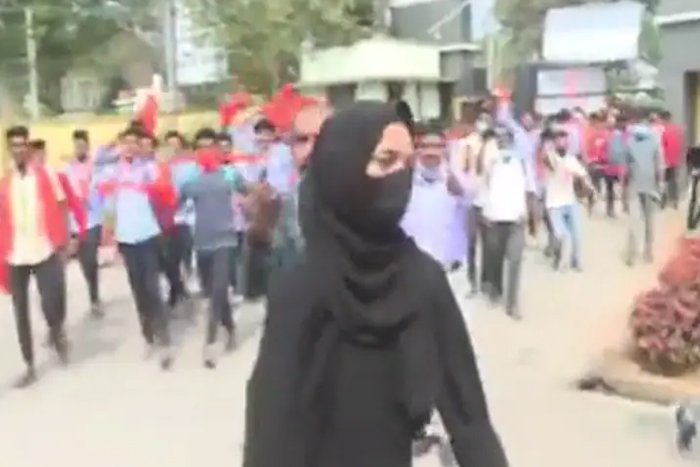Published
3 years agoon

The court was hearing a petition filed by two girl students from Udupi’s pre-university government college against the state government’s directive prohibiting them to attend classes wearing a hijab.
Observing that only a “mischievous section will keep the issue burning,” the Karnataka high court on Tuesday appealed to students and the public at large to maintain peace as the hijab row escalated in various parts of the state.
“People should have faith in the Constitution. Only a mischievous section will keep the issue burning. But making agitation, going on the street, shouting slogans, attacking students, students attacking others…these are not good things,” justice Krishna S Dixit said while deferring the hearing to Wednesday.
On Tuesday, the judge issued a short order “requesting” students and the public at large to maintain peace and tranquillity since the court is already examining issues related to the state government’s prohibitory order of February 5.
The court was hearing a petition filed by two girl students from Udupi’s pre-university government college against the state government’s directive prohibiting them to attend classes wearing a hijab, a headscarf worn by Muslim women.
As the hearing commenced, justice Dixit clarified that his bench would entertain only the legal arguments. “We will go by reason, by law, not by passion or emotions. We will go by what Constitution says. Constitution is the Bhagavad Gita for me. I have taken an oath to abide by the Constitution. Let’s keep emotions aside,” the judge told the lawyers appearing in the case.
Senior advocate Devadatt Kamat made submissions on behalf of the two students, as he began by asking whether the state government was willing to put on hold its prohibitory order till the end of the current academic session so that girls could attend classes and appear for examinations for the time being.
However, Karnataka’s advocate general responded that he was there to assist the court in deciding the questions of law and that educational institutions had the autonomy to take their own decisions on uniforms.
With the state’s unwillingness to suspend the hijab ban, justice Dixit said the court would have to hear the case on merits since the “via media suggestion” by the petitioners were not acceptable to the state.
Commencing his arguments on the points of law, Kamat emphasised the wearing of hijab is not only an essential religious practice for those following Islam, but also a manifestation of an individual’s right to speech and expression, as well as to make choices under the right to privacy.
Kamat attacked the February 5 order as being beyond the scope of the Karnataka Education Act and arbitrary in holding that wearing hijab has the propensity of disturbing public order.
“It is not for the state to decide what is an essential religious practice and what is not. It is only for a constitutional court to adjudicate on such matters,” Kamat said.
To this, the judge replied: “So, the chief issue is whether wearing hijab is an essential religious practice or not. And if it is so, what is the justification for the state to interfere.”
Kamat, on his part, added that denying entry into classroom for hijab-wearing girls was a form of religious apartheid and that it was not an issue of public order as contested by the Basavaraj Bommai-led Bharatiya Janata Party (BJP) government in the state.
While the bench recorded Kamat’s submission, the state’s advocate general strongly opposed this argument. Navadgi urged the bench to also record his submission that such dangerous arguments should not be made considering the sensitivities of various groups in society.
After Kamat concluded his arguments, Navadgi requested the court to pass an interim order restraining people from protesting or demonstrating in the state since the court is already considering the case.
Kamat supported the state’s law officer, saying that nobody should be allowed to take the law in their hands.
The court will resume hearing the case at 2.30 pm on Wednesday and the state government is expected to present its arguments through its law officer.
Even as the court hears the case, students from various schools across Karnataka have faced off with their Muslim classmates over the issue, countering the hijab with saffron shawls and turbans to assert their Hindu faith.
Six Muslim girls were in January denied entry into classrooms wearing headscarves. The issue has since become a fight between right-wing and minority groups, who have asserted it as a religious identity issue, with both sides relentlessly pursuing to make a point.
Students of Mahatma Gandhi Memorial College in Udupi had a showdown of sorts on Tuesday with hijab-wearing girls shouting that they wanted justice and their saffron-clad classmates countering it by chanting Jai Shri Ram.
The petition seeks the fundamental right to practice essential religious practices, including the right to wear a hijab as per Islamic faith, on school premises.
There were some instances of violent clashes in Bagalkote where people pelted stones and police resorted to a baton charge to contain the situation in the district.
Several other colleges and schools in Karnataka have witnessed such confrontations with hijab-wearing women on one side and saffron-clad classmates on the other.
There were clashes and incidents reported in Mandya, Kodagu, Chikmagalur, Shivamogga, Udupi and Bagalkote, among other places, in Karnataka on Tuesday.
